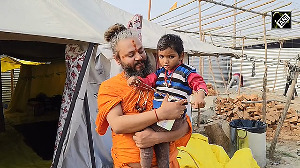"It is poverty porn at its worst. The Mumbai marauders are supposed to have done their deed to hurt India, to challenge its success, to expose its soft underbelly. But this movie has done the job better"
He did not say it, but suggested that the movie was cinematic terror against India. But he had not seen the movie or read the novel. "What kind of diplomat is he, who does the job of a drain inspector? Isn't he supposed to project India in a positive light?" he said of my former colleague, Vikas Swarup.
I teased my friend, "You are like the Soviet citizens of yore, who used to say they hated Dr Zhivago though they had never read the novel." We were both in Moscow in the seventies.
I too had not seen the movie or read the novel, Q&A, now christened Slumdog Millionaire with an eye on the bestseller list, and I too had heard horrible things about the shit pit, the blinding of children with acid and such other horrors of Dharavi slum that the movie presents graphically.
I had also heard that the movie was nominated for the Oscars and A R Rahman had already won the Golden Globe. But I said I would read the novel, see the movie and judge whether the artistic excellence of the film absolves it of its obscenity.
Having read the novel and seen the film, I cannot say that it has done more good than harm to India. This is not a matter of my wanting to shove the reality under the carpet. Vikas Swarup, or any other diplomat, cannot lie abroad for his country anymore.
But the film is exploitation of the novel, of Dharavi, of poverty, of Rahman, of India itself to titillate foreign audiences. It is the exploitation of the new curiosity about India's success. The curiosity today is not about maharajas and snake charmers, magic or rope trick, but about the market and the malls, the computers and the cell phones.
The question is whether India is a boom or a bubble. It seeks to reassure the world, as Jamal says to an American tourist couple, when he rolls on the ground after a brutal beating by the police, 'You want to see the real India? Here it is!'
Vikas Swarup can explain his novel away, as he has done, by saying that he merely held up a mirror to nature and made a hero of a boy from the slums in celebration of his keen eye and keener brain. Even the word 'slumdog' was not his creation. He found a clever story line and wrote a readable novel, though replete with horrible scenes and unpalatable descriptions of his country.
His book would have raised some eyebrows, but passed to obscurity, like some other creations of diplomatic wordsmiths. But he walked into a trap and sold his rights, without caring to insist that the movie should at least be faithful to his novel. The screenplay has very little to do with the novel itself, except the theme of a millionaire rising from a slum to win a fortune by sheer luck.
Even the questions in the book are different from those in the movie. So are the events that helped Jamal (not Ram Mohammad Thomas) to win his millions. Vikas Swarup, the Indian diplomat, became a willing instrument in the hands of his exploiters. 'I am not a millionaire as yet,' lamented Swarup in an interview!
Take the opening scenes of torture. An idiotic policeman carries out the orders of his cleverer and sympathetic boss in the expectation that Jamal would confess to even graver crimes at the end of it. But Jamal did not cheat. The reason he won was that 'it was written.'
Torture is internationally banned and the director of the film knew that India had not joined the global consensus against torture. He also knew that India is obsessed with Amnesty International raising issues of human rights when they hear about torture. The police officer mentions Amnesty as the disaster, not the possible death of the victim of torture. The police man appears to enjoy torturing and even insulting the victim. He provokes Jamal by referring to Latika as the 'bitch of the slum.' The torture scenes do not add much to the story, but denigrates India even more than the slums do.
As though the depiction of squalor, crime and cruelty is not enough, the film challenges India's success. In a relatively harmless scene, in which Jamal and Salim look with pride at the skyscrapers, which had come up where their slums flourished during their younger days, Salim says: 'Today India is in the centre of the world.'
As I heave a sigh of relief that there is at least one line in praise of India, he goes on to say: 'And I am in the centre of it.' He then goes on to say that he is with a gangster. Well, the movie was taken before the revelations about Satyam. Who then are the gangsters in the centre of India as it emerges as the centre of the world?
Consider a question that Jamal could not answer. The quiz master asks what is written below the Ashoka lions on the Indian national crest. Is it truth alone triumphs or lies alone triumph? You don't need to be a rocket scientist to know that this is an insult, particularly as Jamal does not seem to know the answer.
The champions of the film, including my own sons, one, a journalism professor at Columbia University in New York and the other, a young manager and a music and movie enthusiast, say that Slumdog is a cinematographic wonder with excellent acting, soulful music, perfect direction and amazing photography.
'Exuberant, exciting, gaudy, and gritty in a way that can only be called Dickensian, Slumdog Millionaire brings contemporary Mumbai to life from the seamy side up, and it does so with compassion and all-around cinematic excellence,' exults Shashi Tharoor.
Many say that the film will do India proud if Rahman picks up three Oscars. In fact, the music is a redeeming feature of the movie. Even the redlight district scene comes to life with the melody of the anklets on dancing feet. But the celebrated song at the end of the movie sounds like a parody of the national anthem with the use of the phrase, Jai ho!
It was not necessary to rake up the dirt in India to create a film to bring Oscars to India. India rejoiced at the Gandhi Oscars, but Slumdog Oscars, if any, will only highlight how India became a victim of exploitation.
Eminent writer Chitra Banerjee Divakurni claims that the movie is, after all, fiction and it should not hurt anyone. Could this not be dealt with by an inscription that any similarity with reality is pure coincidence? But the makers of the film took special care to shoot on location and document every detail. The purpose was obviously to make the movie as authentic as possible and make an impact. The adverse reaction to the movie in India is precisely because of its authenticity.
The fact remains, however, that the novelist and the makers of the movie have brought to light the horrors of Dharavi. If the passion it has aroused could be directed towards a mass movement to combat the evils of the slum and to eliminate the slums altogether in stages, that would be an appropriate response to the movie.
If those involved in the movie would offer their profits from the film to that movement, they would elevate themselves from exploiters to benefactors.
T P Sreenivasan is a former ambassador of India to the United Nations, Vienna, and a former Governor for India at the International Atomic Energy Agency, Vienna. He is currently the Director General, Kerala International Centre, Thiruvananthapuram and a Member of the National Security Advisory Board.






 © 2025
© 2025